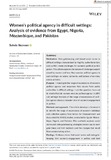| dc.contributor.author | Nazneen, Sohela | |
| dc.coverage.spatial | Egypt | en |
| dc.coverage.spatial | Mozambique | en |
| dc.coverage.spatial | Pakistan | en |
| dc.coverage.spatial | Nigeria | en |
| dc.date.accessioned | 2023-02-09T12:04:12Z | |
| dc.date.available | 2023-02-09T12:04:12Z | |
| dc.date.issued | 2023-01-04 | |
| dc.identifier.citation | Nazneen, S. (2023) 'Women's Political Agency in Difficult Settings: Analysis of Evidence from Egypt, Nigeria, Mozambique, and Pakistan', Development Policy Review, DOI: 10.1111/dpr.12685 | en |
| dc.identifier.uri | https://opendocs.ids.ac.uk/opendocs/handle/20.500.12413/17865 | |
| dc.description.abstract | Male gatekeeping and biased social norms in difficult settings characterized by fragility, authoritarianism, and conflict create challenges for women's political participation. This article explores the nature of challenges experienced by women and how they exercise political agency in such settings—as voters, claimants, and brokers of services, and as activists.
I investigate the range of expressions of women's political agency and responses they secure from public authorities in difficult settings. I ask the question: how and to what effect do women exercise political agency in difficult settings? Analysis of the range of expressions of political agency allows a broader view of women's engagement in politics.
The article develops a framework to identify the range of expressions of women's individual and collective agency from Action for Empowerment and Accountability (A4EA) studies conducted in Egypt, Mozambique, Nigeria, and Pakistan. This synthesis explores social norms and male gatekeeping; strategies women use to navigate these and limit backlash; and the changes that result from women taking action.
Evidence shows that social norms and male gatekeeping limit women's engagement in politics and their relations with multiple public authorities that operate in difficult settings. Women use gender-specific repertoires to organize protests and make claims on authorities and specific strategies to reduce the risk of backlash from their own communities and security agencies. The findings show that, while there is some success in claim-making on specific issues and that at a personal level women feel more empowered, these do not necessarily lead to systemic change.
Donors and local authorities need to develop interventions that tackle male gatekeeping within political parties and communities to facilitate women's political engagement. Flexibility in funding will enable donors to work directly or indirectly with grassroots and national women's rights groups in difficult settings for developing contextualized, bottom-up interventions. Strengthening pro-gender-equality alliances and spaces for deliberation will help to ensure that gender equality is not co-opted by authoritarian leaders and populist groups and will sustain counter-narratives. | en |
| dc.language.iso | en | en |
| dc.publisher | John Wiley & Sons, Ltd | en |
| dc.rights.uri | http://creativecommons.org/licenses/by/4.0/ | en |
| dc.subject | Gender | en |
| dc.subject | Politics and Power | en |
| dc.subject | Security and Conflict | en |
| dc.title | Women's Political Agency in Difficult Settings: Analysis of Evidence from Egypt, Nigeria, Mozambique, and Pakistan | en |
| dc.type | Article | en |
| dc.rights.holder | © 2023 The Author. Development Policy Review published by John Wiley & Sons Ltd on behalf of ODI. | en |
| dc.identifier.externaluri | https://onlinelibrary.wiley.com/doi/full/10.1111/dpr.12685 | en |
| dc.identifier.team | Power and Popular Politics | en |
| dc.identifier.doi | 10.1111/dpr.12685 | |
| dcterms.dateAccepted | 2022-12-16 | |
| rioxxterms.funder | Department for International Development, UK Government | en |
| rioxxterms.identifier.project | PO7239 Action for Empowerment and Accountability Programme | en |
| rioxxterms.version | VoR | en |
| rioxxterms.versionofrecord | 10.1111/dpr.12685 | en |
| rioxxterms.funder.project | 5cecb4e4-a784-4ff9-b559-66fc23b1b999 | en |


